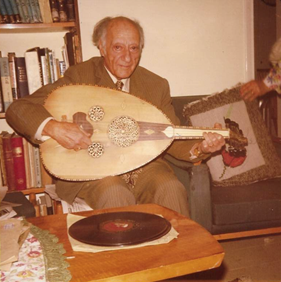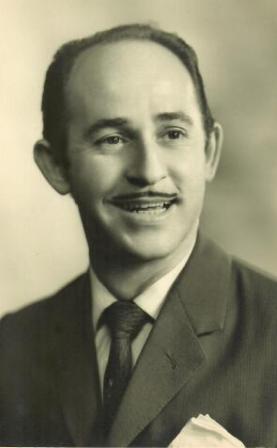Kashtan (Shlomoh ben Shimshon, or Salomon, the son of Samson), aka Salomon Weintraub
By Daniel S. Katz
Cantor Salomon, known as “Kashtan” (ca. 1781-1829), was born in Starokostyantyniv (Alt-Kostantin, about 175 miles west of Kiev). He was apprenticed at the age of nine to an itinerant Eastern European cantor, and maintained this lifestyle throughout nearly all of his career. He is most closely associated with the Jewish community of Dubno (today in western Ukraine), but although he officially served there as cantor, he spent relatively little time there aside from the High Holy Days. Instead, he regularly went on tour with a small group of assistant singers (m’shor’rim) to sing and lead services in Jewish communities throughout Eastern Europe. Because of the exceptional musical and emotional power of his singing, he attained a degree of fame and stardom comparable to that of Yossele Rosenblatt a century later.
Cantor Salomon became an acclaimed exponent of Jewish Eastern European culture and tradition. Christians as well as Jews responded to the vibrancy of his singing, and on at least two occasions his virtuosity won him the support and admiration of Russian government officials. His audience extended across all of Eastern Europe. He traveled not only as far as Riga and Budapest, but also crossed the border from the Russian Empire into Prussian territory. He was even offered a permanent position in Kępno (Kempen), which then belonged to Prussia. However, he stayed there only for a year.
There is no question about the historical role and importance of Cantor Salomon in the writings of cantors and musicologists of the nineteenth and twentieth centuries. Nearly a century ago, Aron Friedmann, the chief cantor of the Jewish Community of Berlin, declared in his compendium of short cantorial biographies that Salomon was “the greatest cantor of his time” and “is acclaimed among cantors even today” (Friedmann 1927: 134).
Idelsohn (1929: 266-267) reports that Salomon had “the greatest voice of his time. His coloratura... was inimitable even by instruments. He was, at the same time, a man of profound religious devotion and piety, and of a great knowledge of Hebrew literature…. His ...performance was overwhelming, and nobody could resist being moved to tears when he intoned those tunes which express pain. He could, on a simple Shabbos, create the atmosphere of Yom Kippur, and in the following moment rouse the whole congregation from deep melancholy to the mood of dance.”
Salomon’s son, Hirsch Weintraub (ca. 1813-1881), was also a famous cantor. However, “Weintraub” seems not to have been Salomon’s name (at the time when Salomon was born, most Jews in the Russian Empire did not have family names). Similarly, Salomon’s mentor had started calling him Kashtan (“chestnut”) by the time he was twelve years old at the latest. It is clear from Hirsch Weintraub’s writings that “Kashtan” was a nickname, and was used in Jewish contexts. Although it referred initially and primarily to Salomon, it was applied subsequently also to Salomon’s brother and Hirsch. Nevertheless, the secondary literature often uses the terms “Kashtan” and “Weintraub” interchangeably as if they were both Salomon’s last name (see Katz 2010: 546-555 for a discussion of these names).
Because of the efforts of Hirsch Weintraub, Salomon was one of the earliest synagogue cantors whose musical compositions are extant today, and the earliest whose music is accompanied by a biography. Weintraub not only published a volume of his father’s music in 1859, but also wrote a biography of Salomon, published in ten installments in the Hebrew newspaper Ha-maggid in 1875. Its appearance forty-five years after Salomon’s death is perhaps the best testimony to his on-going fame.
Weintraub (1859) is still the only published collection of Kashtan’s music. Three individual compositions are catalogued in Adler 1989 (see Katz 2021-2022: n.13-15 for further bibliography and transcriptions).
A three-year research project on the life and music of Cantor Salomon is now in progress at the Martin Buber Institute of the University of Cologne, Germany. Its objective is to publish the Hebrew text of Hirsch Weintraub’s biography of his father, together with an English translation, a commentary, the original German text of Hirsch’s brief autobiography (essentially a curriculum vitae in narrative form), and a catalogue of Salomon’s music compositions.

'V'eineinu tirenna' from a Qeddushah attributed to Kashtan, First half of 19th century. From a cantor's manual in the Eduard Birnbaum Music Collection, Mus. 30a, f. 6a. Courtesy of the Klau Library, Cincinnati, Hebrew Union College-Jewish Institute of Religion. For a modern transcription see Katz 2021-2022.
Selected Bibliography
Adler, Israel. 1989. Hebrew Notated Manuscript Sources up to circa 1840: A Descriptive and Thematic Catalogue with a Checklist of Printed Sources. 2 vols., Munich: G. Henle. (Répertoire International des Sources Musicales, B IX1)
Friedmann, Aron. 1927. Lebensbilder berühmter Kantoren, vol. 3. Berlin: Hilfskasse für israelitische Kantoren und Kultusbeamte.
Harris, Hyman H. 1950. (חיים הריס). Toldot han’ginah v’hachazanut b’Yisrael (Hebrew Liturgical Music). New York: Bitzaron.
Idelsohn, Abraham Zevi. 1929. Jewish Music in Its Historical Development. New York: Henry Holt.
Katz, Daniel S. 2021-2022. “Another Mimkomkha by Cantor Salomon (“Kashtan”): A Transcription and Analysis.” Musica Judaica 23 (2021-2022), forthcoming.
_____. 2020. “A Chestnut, a Grape, and a Pack of Lions: A Shabbos in Płock with a Popular Synagogue Singer in the Early Nineteenth Century.” Polin: Studies in Polish Jewry 32, pp. 15-29.
_____. 2010. “Music That Escaped: Transcriptions of Two Songs of Praise From a Surviving, but Still Hidden, Synagogue Repertory.” Fiori Musicali: Liber amicorum Alexander Silbiger, ed. Claire Fontijn with Susan Parisi. Sterling Heights, Michigan: Harmonie Park Press. (Detroit Monographs in Musicology / Studies in Music, no. 55), pp. 525-573.
Weintraub, Hirsch (ed.). [1859] Shirei Shlomoh: Grösstentheils componirt von meinem seeligen Vater Salomon Weintraub genannt Kaschtan. Dritter Theil des Schire Beth Adonai. Leipzig: Breitkopf & Härtel, Reprint, in Out of Print Classics Series of Synagogue Music (v. 21). New York: Sacred Music Press, 1955.





